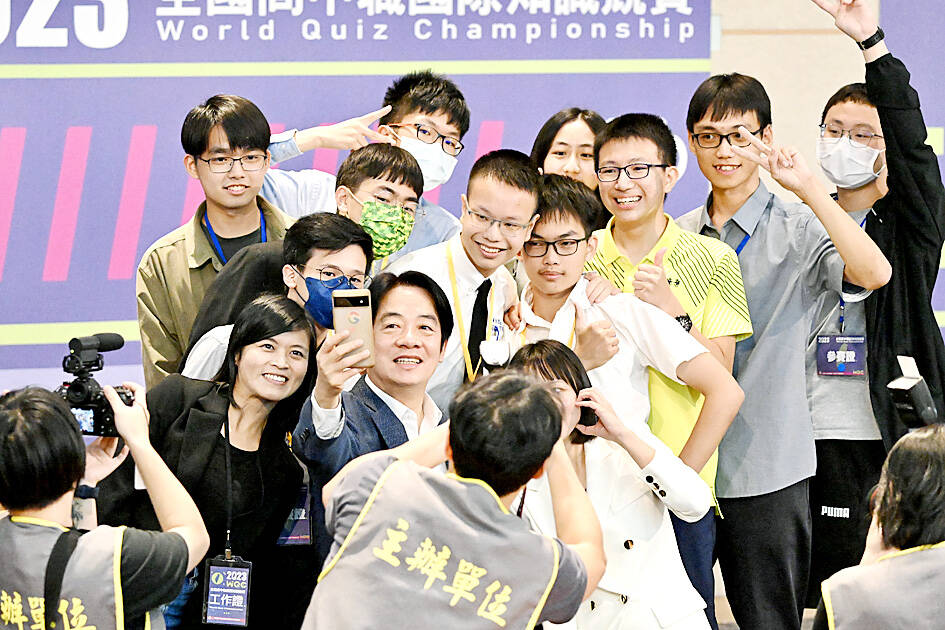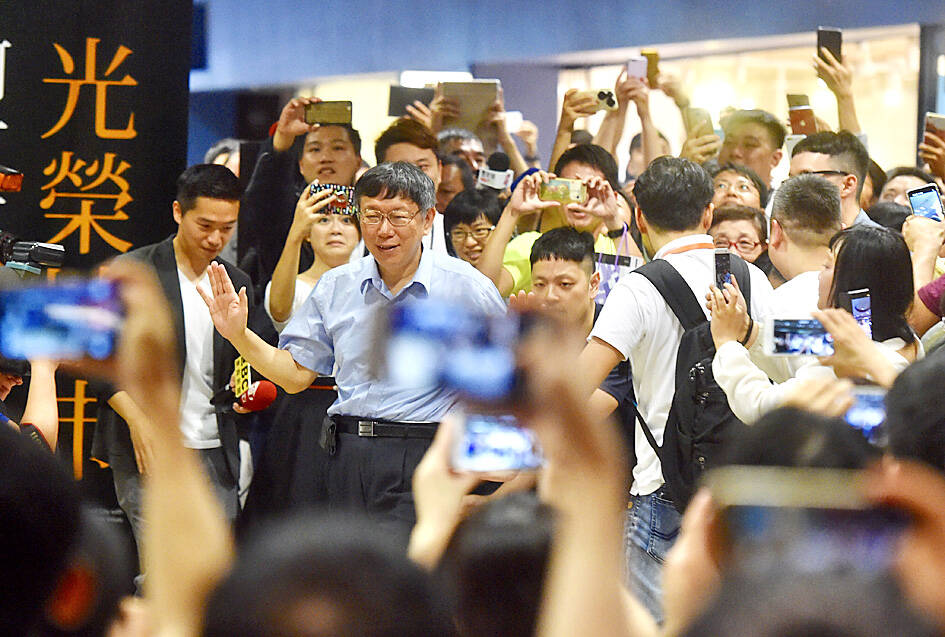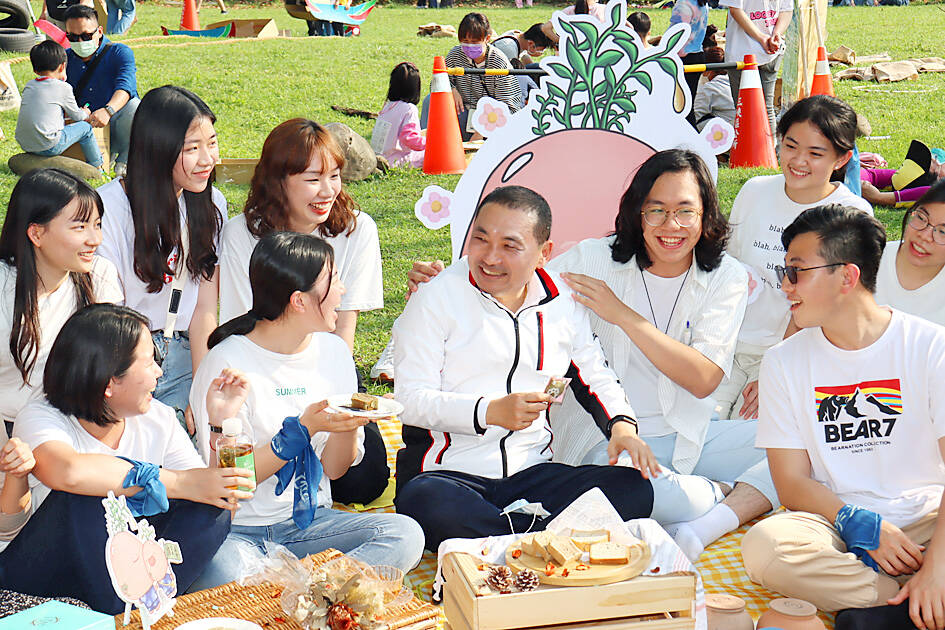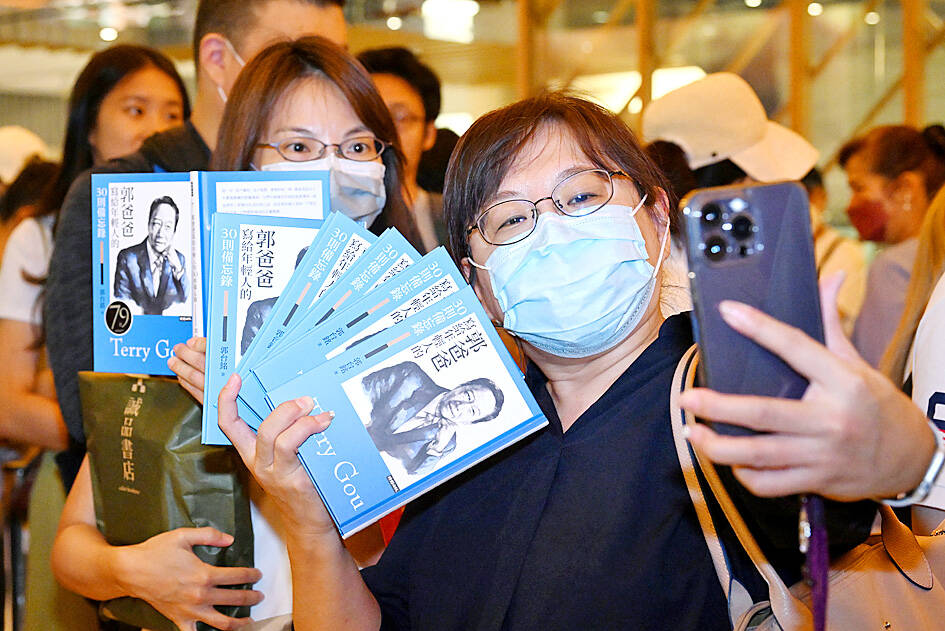From belting out pop songs to fielding hairstyle questions on Instagram, Taiwan’s presidential hopefuls are increasingly turning their attention to young voters, who are expected to play a key role in the presidential and legislative elections on Jan. 13 next year.
The outcome of the closely watched vote is likely to set the tone for Taipei’s tumultuous relationship with Beijing.
In 2020, just after democracy protests in Hong Kong, President Tsai Ing-wen (蔡英文) and her Democratic Progressive Party (DPP) won a landslide victory, partly because of high turnout among younger voters, according to analysts and voter surveys.

Photo: George Tsorng, Taipei Times
The DPP is on track to retain power for a third term, with the party’s candidate, Vice President William Lai (賴清德), 63, leading opinion polls.
Younger voters are again playing a role, but this time they are gravitating to a dark horse candidate who has become the DPP’s closest challenger.
Taiwan People’s Party (TPP) Chairman Ko Wen-je (柯文哲), a 64-year-old former Taipei mayor, has won over many younger voters with plain talk on issues such as high housing costs, rather than focusing on the China threat.

Photo: Chien Jung-feng, Taipei Times
Young Taiwanese “cannot find good jobs, cannot afford to buy houses, do not dare to get married and do not want to have kids,” Ko told a youth forum for last month. “Being innovative is Taiwan’s only solution.”
Known affectionately by his supporters as KP, Ko’s non-traditional approach to politics — as seen in his energetic dance moves at a fundraising concert last month — has also endeared him to young voters fed up with how two parties have dominated the nation’s politics.
While Ko of the small TPP lags Lai by 17 percentage points, he leads among voters younger than 40, a Taiwanese Public Opinion Foundation survey conducted in the middle of last month found.

Photo: Wong Yu-huang, Taipei Times
Lai and the DPP have framed the ballot as a choice between democracy and authoritarianism. The party’s traditional rival, the Chinese Nationalist Party (KMT), has cast it as a “war or peace” election.
“My responsibility is to give hope to the young people. Only when the young people have hope does our country have hope,” Lai told foreign media last week, when asked why young people were drifting from the DPP.
A late bid for the presidency announced last week by Terry Gou (郭台銘), 72, the billionaire founder of Hon Hai Precision Industry Co, has further energized the race to win over voters.

Photo: Liao Chen-huei, Taipei Times
At third place in the polls, and trailing Ko and Lai in the under-40 cohort, is New Taipei City Mayor Hou You-yi (侯友宜) , 66, the KMT’s candidate.
Capturing the youth vote is a perennial challenge for the former governing party, with only about 3 percent of its 300,000 members younger than 40, KMT official Ho Chih-yung (何志勇) said.
Over the past few months, the party has held programs for young people, including a model parliament and seminars on possible conflicts with China.
“Every four years, there are first-time voters coming out that could be the margin between victory and defeat,” said Ho, who helped organize the events. “Every party is trying to get their support.”
Focusing on such issues might not necessarily to win over would-be voters such as Zheng De-wei, 25, a graduate student who said his friends are more concerned about getting by in an economy set to grow at its slowest pace in eight years.
“The priority is to be able to make a living,” said Zheng, who described himself as “politically neutral.”
Although it might have a healthy lead in opinion polls, the DPP is acutely aware of the dangers of losing younger voters.
In an official review of its defeat in the local elections in November last year, where its China-focused campaign failed to mobilize voters more concerned with issues such as crime and pollution, the DPP said it must “deeply reflect” on why it had “lost the support of young people.”
In a bid to win them back, Lai has ramped up social media campaigns.
At the end of last year, about 19 million of Taiwan’s 23 million people were eligible to vote, with about one-third aged between 20 — the legal voting age — and 39, government data showed.
Although voting data is sparse, Chen Kuang-hui (陳光輝), a political science professor at National Chung Cheng University, and other political watchers pointed to a survey by the Central Election Commission showing that the turnout of those aged 30 or under rose 15 to 20 percent in 2020 compared with the previous two elections.
The turnout for people aged 31 to 40 increased 10 to 15 percent, the survey said.
“If young people who don’t vote or infrequently vote at a certain moment come out to vote, they really could have a critical impact on the election,” Chen said.

Chinese spouse and influencer Guan Guan’s (關關) residency permit has been revoked for repeatedly posting pro-China videos that threaten national security, the National Immigration Agency confirmed today. Guan Guan has said many controversial statements in her videos posted to Douyin (抖音), including “the red flag will soon be painted all over Taiwan” and “Taiwan is an inseparable part of China,” and expressing hope for expedited reunification. The agency last year received multiple reports alleging that Guan Guan had advocated for armed reunification. After verifying the reports, the agency last month issued a notice requiring her to appear and explain her actions. Guan

GIVE AND TAKE: Blood demand continues to rise each year, while fewer young donors are available due to the nation’s falling birthrate, a doctor said Blood donors can redeem points earned from donations to obtain limited edition Formosan black bear travel mugs, the Kaohsiung Blood Center said yesterday, as it announced a goal of stocking 20,000 units of blood prior to the Lunar New Year. The last month of the lunar year is National Blood Donation Month, when local centers seek to stockpile blood for use during the Lunar New Year holiday. The blood demand in southern Taiwan — including Tainan and Kaohsiung, as well as Chiayi, Pingtung, Penghu and Taitung counties — is about 2,000 units per day, the center said. The donation campaign aims to boost

The Kaohsiung Tourism Bureau audited six hotels in an effort to prevent price gouging ahead of Korean band BTS’ concert tour in the city scheduled for Nov. 19, 21 and 22 this year. The bureau on Friday said that the audits — conducted in response to allegations of unfair pricing posted on social media — found no wrongdoing. These establishments included the local branches of Chateau de Chine, Hotel Nikko, My Humble House, and Grand Hai Lai, it said, adding that the Consumer Protection Commission would have penalized price gougers had the accusations been substantiated. The bureau said the Tourism Development Act

BACK TO WINTER: A strong continental cold air mass would move south on Tuesday next week, bringing colder temperatures to northern and central Taiwan A tropical depression east of the Philippines could soon be upgraded to be the first tropical storm of this year, the Central Weather Administration (CWA) said yesterday, adding that the next cold air mass is forecast to arrive on Monday next week. CWA forecaster Cheng Jie-ren (鄭傑仁) said the first tropical depression of this year is over waters east of the Philippines, about 1,867km southeast of Oluanpi (鵝鑾鼻), and could strengthen into Tropical Storm Nokaen by early today. The system is moving slowly from northwest to north, and is expected to remain east of the Philippines with little chance of affecting Taiwan,